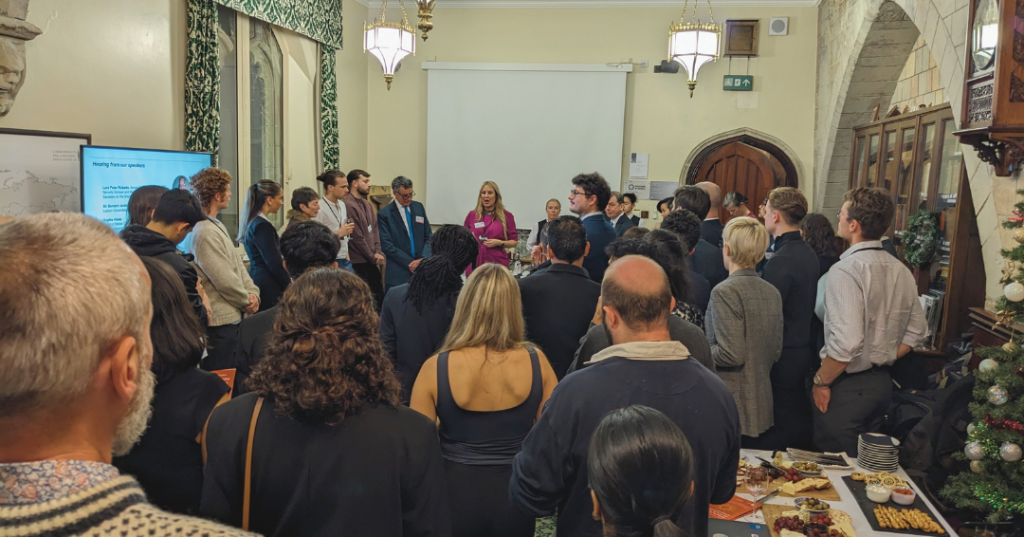
Just before the British Parliament was dissolved ahead of our General Election, a bipartisan scrutiny committee of senior MPs squeezed out a report on improving the quality of strategic thinking in government and the civil service. It had been a year in the making. The report is called ‘Promoting National Strategy’, and recommends–among other things–improving long-term thinking in government through an annual published long-term trends assessment, intergenerational impact assessments and a new Committee for the Future.
This is the first time that any part of the UK government has had a holistic discussion on how to safeguard the wellbeing of current and next generations. I was one of two Specialist Advisers to the Liaison Committee’s inquiry, and I am thrilled to share some highlights from the Committee’s report, focusing on the parts about governance in times of uncertainty and the protection of democracy for future generations.
“Getting Parliament and government to be more strategic than they have been over the past 20 or 30 years is vital to restoring public confidence in our entire democratic system, particularly among younger generations who will inherit the consequences of what governments do now. The next government should seize this offer from Parliament to support and scrutinise strategic thinking for the future.”
– The Chair of the Liaison Committee, Sir Bernard Jenkin MP
The report joins a growing number of innovations globally on how governments can engage different generations and improve long-term thinking. Seeing politicians start to think about how best to act as stewards for the long-term, I am hopeful that this is part of a broader wave of change in how governments look to the future.
Why this report is needed
The Liaison Committee is a senior UK parliament committee made up of the chairs of Commons’ Select Committees, which both review policy issues and focus on areas neglected by the government of the day. It plays a critical role in scrutinising policy, including questioning the Prime Minister several times per year. The work here of the Liaison Committee Chair Sir Bernard Jenkin, the committee members, and my fellow Specialist Adviser Major General Jonathan Shaw, heroically supported by a spectacular team of parliamentary officials, has come at a vital time.
The report emphasises Parliament’s central role in linking voters with government priorities as part of combating voter disillusionment, especially among younger generations. It highlights the role of long-term thinking to engage the public and ensure popular consent, again essential for younger voters who will bear the consequences of today’s decisions.
Recommendations
My role as specialist adviser was to do three things: bring insights on embedding long-term thinking, connect to global experts and–crucially–link to coalitions of young, diverse people who are doing strategy differently.
The report covers strengthening Whitehall capacity to support strategy (Including a new National School for Government), proposals for strengthening the role of the cabinet office and Treasury, a rich series of recommendations around governing for the future, and a focus on the role of Parliament – especially select committees – in supporting this change.
Recommendations include:
- a single cross-government trends report that looks at the long-term, published every year, which sets out long-term trends and policies vital for national wellbeing;
- a process for engaging citizens on upcoming issues and how they might be resolved
- an institution at the centre of government for discussing the implications and consequences of change
- a way in which strategic-thinkers beyond government can be networked together–this might be a new Committee for the Future.
The Committee observes that if the long-term trends report was published at the same time as Britain’s annual King’s Speech, which sets out the government’s legislative agenda for the coming year, it would be likely to improve the coherence of overall government strategy.

It was a privilege to see the evidence from such different perspectives come together in service of underlining the importance of intergenerational and long term policymaking in the UK – from the Prime Minister Rishi Sunak, to Sophie Daud, the Head of the Civil Service Simon Case, Sophie Howe, Elle Farrell-Kingsley from NSxNG, Next Generation Champions, Involve, Restless Development, the Welsh FG Commissioner’s Derek Walker, Lord Harris from the National Preparedness Committee, Institute for Government, and Lord Robertson.
Evidence all governments need to know about
Of course, the Liaison Committee wasn’t working in a vacuum. The whole question of long-term thinking and inter-generational engagement is moving rapidly towards the mainstream. There’s a whole swathe of evidence about governance innovation in this area – particularly the role of legislatures:
- global evidence on how governments have integrated long-term thinking into policy making – documented in this report by SOIF and the UK Government Office for Science;
- research and practice across multiple sectors and countries showing that public engagement, civil service capability and political leadership are needed together to drive transformation–as the Liaison Committee report highlights;
- infrastructure to connect citizen participation into national long-term planning – as tried and tested in the National Strategy for the Next Generations;
- frameworks and tools that show how to align decision making with intergenerational fairness;
- examples from leading countries such as Finland, Singapore and Wales as well as recent adopters like Kenya; and
- networks of early adopters like SOIF’s Future Pioneers network who are all looking to build and accelerate adoption of long-term governance in their countries.
- the Wales Protocol – an implementation framework designed to guide communities and world leaders towards a more sustainable and equitable future
Looking to the Future
The question addressed here isn’t new, of course. It’s been moving up the UK policy agenda slowly for more than 15 years as Britain’s policy infrastructure is failing to address the challenges we face. Whether these challenges are low productivity and economic performance, the persistence of child poverty, health and social care delivery, an ageing population, housing, the delivery of basic services– we would benefit from better engagement and a more coherent, longer-term approach to national strategy. The current governance system isn’t working. And it seems that all parties agree that it needs a change.
If you want to join SOIF’s Future Pioneers network and feed innovations into the UN Summit of the Future–contact us.
